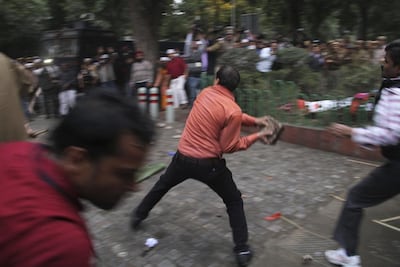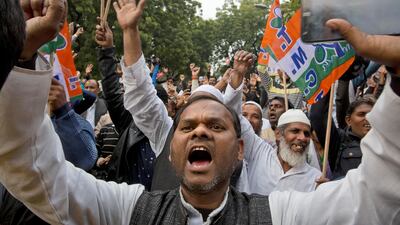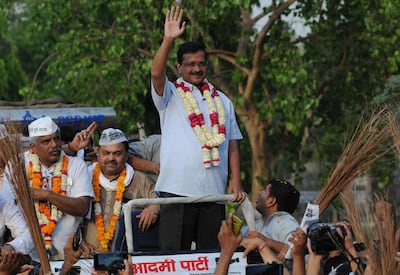With less than a week to go in the biggest election in the world, with some 900 million Indians voting at one million polling booths across the country, emotions are running high. Just before the last round of voting began on Sunday, a female candidate for the Aam Admi Party in New Delhi broke down at a press conference. Atishi, who goes by one name, wept as she read aloud from a derogatory pamphlet, which she claims was circulated by her Bharatiya Janata Party rival, cricketer-turned-politician Gautam Gambhir. It called her a "prostitute", "beef-eater" and a "very good example of a mixed breed", contained defamatory allegations that she was having an affair with one of her party's leaders and accused Delhi chief minister Arvind Kejriwal, also from the AAP, as being "born of unlawful parents".
Gambhir has denied the accusation of circulating the leaflet but the bitter exchanges between the BJP and AAP mark a new low in India’s political discourse, in what has become the most abusive election campaign in recent history. Rather than issues dominating the agenda, the loudest voices have been those spewing out bitter and poisonous vilification.
Insults and attacks have become worryingly frequent. Mr Kejriwal has been slapped, smeared with chilli powder and pelted with eggs, but the abuse has come from all sides. Perhaps the most oft-repeated refrain has been opposition leader and Congress Party president Rahul Gandhi calling Indian Prime Minister Narendra Modi "chor", meaning thief, so often it has formed part of his campaign slogan, "chowkidar chor hai", a play on words meaning "the watchman is a thief".
Mr Modi finally retaliated last week and in the process, succumbed to bad taste by calling Mr Gandhi’s late father, the former prime minister Rajiv Gandhi, “Mr Corrupt number one”.
The pattern goes thus: a political leader insults a rival. The rival retaliates with a choice epithet. When the latter is criticised, he or she strikes an injured tone and bleats: “I didn’t start it. What about the insult against me?”
Then a free-for-all breaks out as both politicians dig out examples from years ago to prove who is to blame.
While this campaign has plumbed new depths, the coarsening of political dialogue has been underway for some years. In 2007, Rahul Gandhi’s mother Sonia called Modi a “merchant of death”. Since he became prime minister, political rivals have likened Modi to Hitler, Mussolini, Goebbels and Qaddafi.
Mr Modi’s BJP party has called Mr Gandhi a “foreigner” because his mother is Italian and labelled him “pappu”, the Hindi term for a naive young boy.
The most disappointing aspect to the mud-slinging is that it has not been restricted to the lower houses of parliament. Cabinet ministers and Mr Modi himself have waded in and failed to hold themselves to a higher standard, or to set the tone.

Pavan Varma, the spokesman for the Janata Dal (United) party, says the level of personal invective is alarming: "Every society has an inbuilt moral compass indicating what is indecent. The political class in this country has lost this compass."
The reason for the abuse and character assassination is simple: it is driven by a desperation to win power. Politicians in previous eras used to fight one another on ideological grounds and even when they disagreed, they still carried a modicum of respect for their opponent’s views. Politics was always adversarial but a certain protocol was maintained. A bitter rival would cross the floor of parliament to shake the hand of an MP who had made a good speech. A rival’s personal life was never a subject for debate or acrimony.
Now it seems every consideration of taste or civility has been subordinated to the desire to win. The Election Commission of India has prescribed a code of conduct for all politicians, prohibiting abuse. But by the time the ponderous commission acts on a violation, the abuse has already spread far and wide.
The vulgar insults are alarming in themselves but they also embody an even more worrying trend that could be dangerous for Indian democracy. Since 2014, when the BJP came to power, some of its leaders have made it a habit to call anyone who criticises the government’s policies as “anti-national” or “unpatriotic”.

This has rendered civilised debate on important issues impossible. The views of someone dubbed a “traitor” are, ipso facto, irrelevant and means the person can be fair game for trolling on social media and worse.
Female journalist and former NDTV anchor Barkha Dutt is routinely trolled and threatened with rape and other acts of savagery whenever she condemns the government. The abuse is a way of disqualifying and silencing critics and of bestowing moral legitimacy only on the ruling party.
It could be argued that levels of political conduct are falling in many parts of the world but one aspect of this campaign that is particularly appalling – and which not new – is the viciousness with which female politicians such as Atishi are attacked.
Back in the 1960s, when former prime minister Indira Gandhi was first entering politics, she was called “goongi gudiya”, meaning mute doll, by a rival. Since then, women who seek public office have had to brace themselves for their character, clothes, figure, hair, habits and make-up to be denigrated. Veteran politician Mayawati has been ridiculed for her outfits, handbag and hairstyle throughout her long career. In March, the BJP’s Surendra Narayan Singh mocked her for having “facials every day” and colouring her hair.
What Indian voters make of this abuse and misogyny remains to be seen on May 23. So far, there has been no outward sign of them being repelled from supporting certain candidates. In this, however, India might not be an outlier. Let's not forget that German Chancellor Angela Merkel and British Prime Minister Theresa May regularly have their appearances and fashion choices scrutinised and held up for ridicule.
And let’s also not forget that on the campaign trail, US President Donald Trump accused Mexicans of being murderers and rapists. Then, it made little difference to his support base. India is unlikely to be any different. But that doesn’t mean the venom that has spewed forth over the past few weeks should ever become accepted as the norm.
Amrit Dhillon is a freelance journalist based in New Delhi


